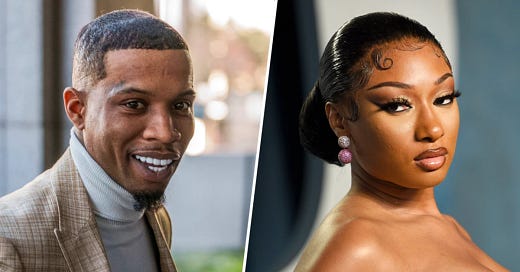extra update: the people vs. daystar peterson
what the tory lanez trial taught me about media lit & the need for Black media
Over the last couple of weeks, I’ve been quietly watching Tory Lanez case unfold. I say quietly because - due to the nature of the court proceedings - it was tough to get accurate information.
I’m a strong proponent of being quiet when you don’t have all of the facts. I wish more people would learn that lesson and apply it to their lives, but I digress.
If you’re unfamiliar, Tory Lanez (Canadian rapper/singer, born Daystar Peterson) was accused of shooting Megan Thee Stallion (rapper, born Megan Pete) back in July 2020. This trial has been going on for TWO YEARS in the court of public opinion, and it’s been hard to watch.
The purpose of this extra update is not to rehash the details of the case - all you need to know is that Tory was found guilty of all three of the charges levied against him. This note is meant to discuss all of the things that happened around the trial, and why I, as a trained journalist, am worried about how information gets shared in the age of social media.
media literacy is at an all-time low.
For those of you that don’t know, I spent four years in a classroom teaching high schoolers, and for the majority of that time, I was teaching digital media. We talked about everything, from social media, to what makes a story newsworthy and more.
My goal as a teacher was to help them tell stories, and understand what stories were real or fake. There are times when I wish that I could enroll some adults in this same curriculum. There are literally people who believe anything because it’s written on the internet, and refuse to apply any critical thinking to anything they see or hear.
If I can think of anything that’s scary to me it’s that. You may be thinking, come on Andrea, that seems dramatic. But when you watch people begin to believe things that are made up, it becomes dangerous. If you don’t believe me, ask Meghan Markle, Megan Thee Stallion, and Nancy Pelosi. They’ve all been threatened, or worse, based on people believing misinformation born on the internet.
What starts this? The media landscape is very different now. It’s not like 20-30 years ago when there were only corporate media companies. Today, literally anyone can be a media company. As someone who studied journalism, I think that can be good, but it can also be very bad. With the barrier to entry being an internet connection, and the internet being everywhere… it’s hard to manage where stories are coming from, which has created a wild, wild west online.
bloggers vs journalists.
To me, the root of this issue stems from a lack of understanding of the differences between bloggers and journalists, and gossip blogs vs. news outlets. When everyone can be who they want online, it’s easy to fall into the trap of thinking someone is an authority, because they say they are.
Here’s how I typically break it down: a blogger is someone who is providing opinions or cultural commentary. Journalists provide fact-based, well-researched, and unbiased reporting on events. In the Black community, we have a lot of blog sites, and not a lot of real news media platforms. That’s something that should really change.
we need more Black media.
I saw a picture of the leading Black media platforms at The White House not too long ago, and represented in the photo were The Jasmine Brand, The Breakfast Club, Hollywood Unlocked, and The Shade Room. I am not a hater, all of these platforms have their space in the media landscape. But all of them are entertainment focused, and often breed very negative, gossipy comment sections more than they actually provide well-researched information and facts.
When I think about the Tory Lanez trial, there were very few reporters that made it into the courtroom. The representation from hip-hop blogs was very heavy, but there weren’t many if any legacy Black publications (think Essence, Ebony etc.) that were represented in the courtroom. With so much on the line, it’s tough for me to swallow and watch as non-Black people tell Black stories. A key to effective storytelling is understanding the cultural nuance that comes with the story. It’s not difficult to see, then, and for that reason, that we should have more media outlets that are FUBU.
Sometimes when things bother me I know that it means that I need to do something about it. Hopefully, you’ll stick around and join me as I work to develop my own solution to this Black media drought. Stay tuned.
Merry Christmas! I’ll see you next Friday.







